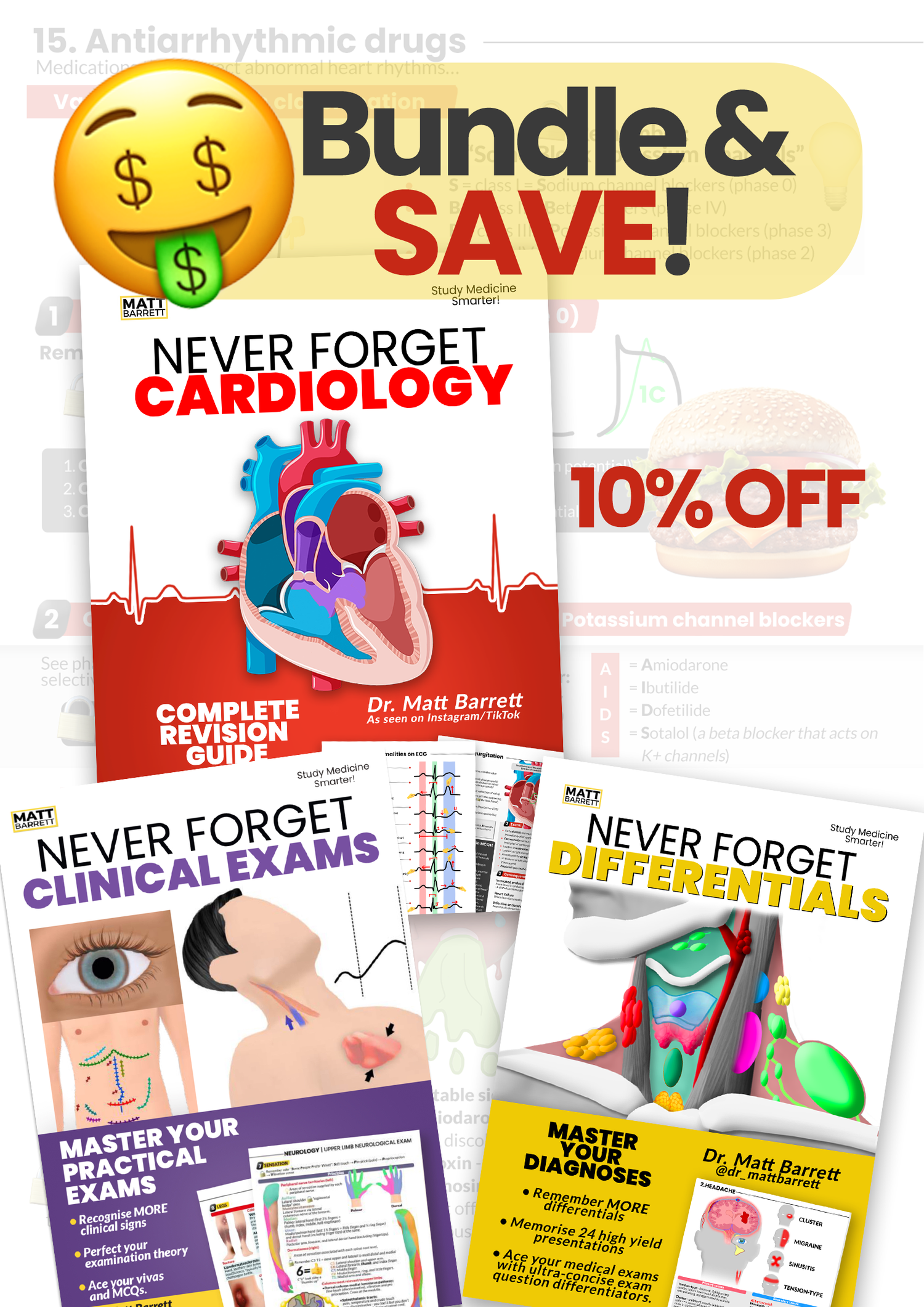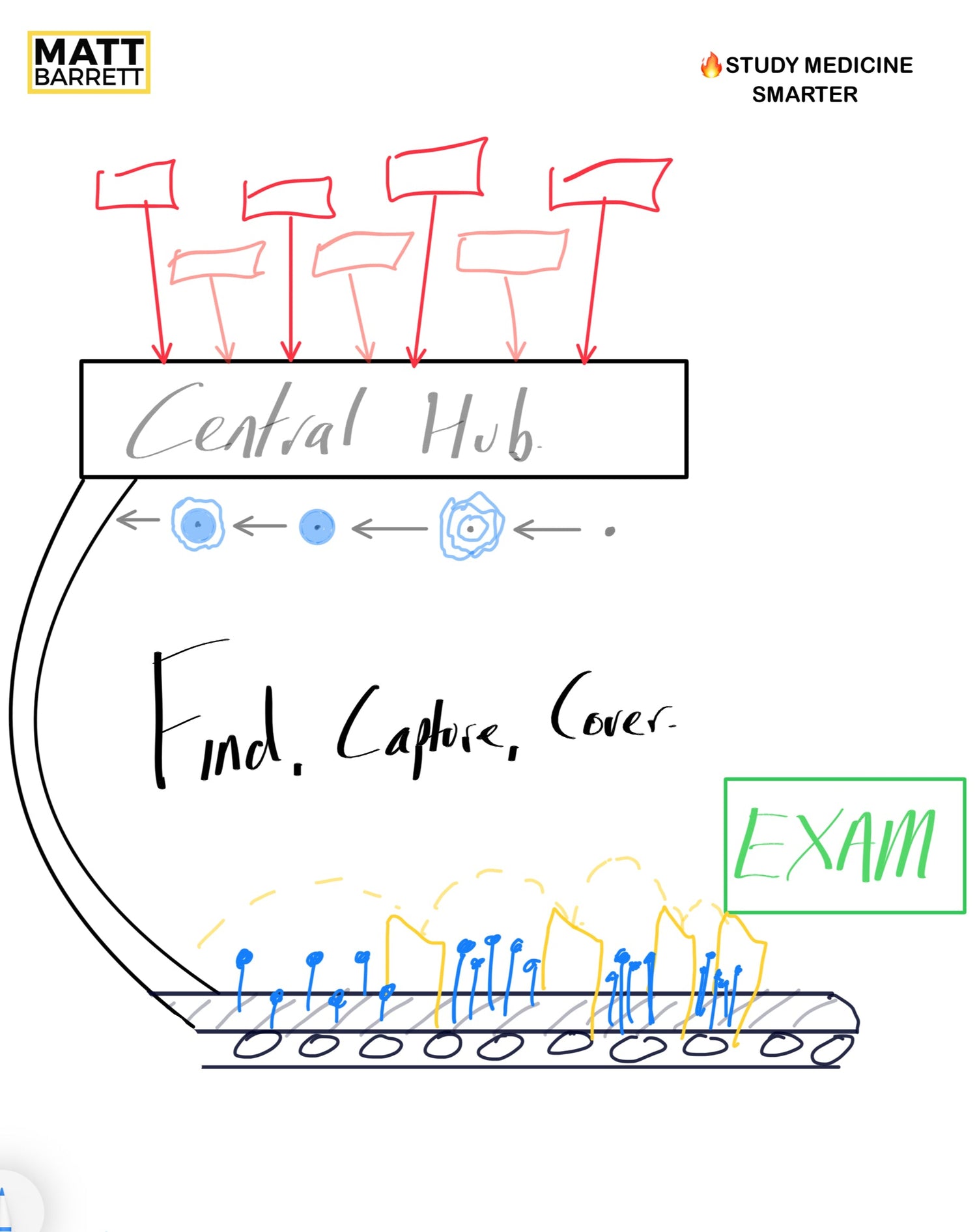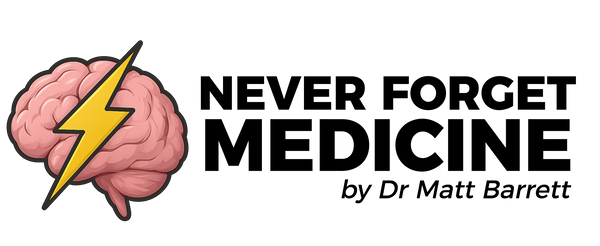How I consistently ranked first at medical school.
Studying loads but feel like its not sticking? You’re not alone. Theres way too much content to retain at medical school and we're not typically taught how to learn efficiently.
🧠 You don’t need more hours. You need a better technique.
Once you fix that, you can finally:
- Cover more content in less time
- Unlock more time to invest elsewhere
- Make space for what matters most to you beyond studying e.g. making memories, building a competitive CV for those super competitive training spots or rotting to Netflix.
Here's why I can help you...
I didnt get into medical school first time.
After years of aspiring to get there, I was absolutely gutted. I was the first in my family to ever apply to university. I ended up doing biomed, fully set on reapplying... it turned out to be the best thing that happened to me.
I learned how to study smarter and ranked first each year
Through my undergrad I figured out how to smash the academics and still have time to do everything I could to get into medical school after, and actually enjoy life outside of studying.
I learned how to study smarter, ranked first every year of my biomedical science degree and got into Barts medical school (QMUL in London) in 2016.
It didn't stop when I got into medical school. Each year I studied smarter and consistently ranked first each year (bar one!) whilst making more time for my other passions. but more importantly...
...with plenty of time to supercharge my CV.
- 10x academic prizes
- 20x research papers written (most got published)
- Founded and ran Europes largest undergrad ortho conference for 3 years running
- Leading to the birth of a national orthopaedic organisation recognised by BOA/BOTA
- Co-founded a seed-funded start up in virtual reality medical education
Now I help students and doctors do the same!
If you're studying lots of content and its not sticking... firstly, don't be too hard on yourself, its totally expected. Secondly, good news... its a skill you can master by studying smarter.
I help students and doctors do just that.

What to study.
Garbage in. Garbage out.
Your exam preparation is only as good as the content you feed into your study system.
Three principles here:
1. Focus on the high yield stuff
2. Priotise understanding before locking in with mnemonics that actually resonate with you.
3. Learn the buzzwords, associations, typical exam answers and counterfactuals to differentiate your exam answers.
If you’d rather not build this yourself from scratch, my Never Forget series has already done the heavy lifting — with over 1,000 copies sold so far!
👉 Never Forget Cardiology
👉 Never Forget Differentials
👉 Never Forget Clinical Examinations
👉 ...and many more to come!

How to study.
Just as important of what to study, is how to study.
Over 10+ years in higher education and clinical practice, I've built a method I call the Find, Capture, Cover system — rooted in learning science and shaped by the exact strategies that helped me consistently rank first through my medical and biomedical degrees.
Study smarter. Study less. Remember more!
It’s about making the most of what you’re already learning — so you can retain it, apply it, and create time for everything else that matters besides studying.
8 Steps to study medicine smarter
🔒 Unlock the MedEd Vault
Sign up for discounts, news and access to my collection of the internet’s best free MedEd resources you probably didn’t know existed!
1 | Become a curator.
There’s a clear divide in medical education.
In pre-clinical years, you’re mostly spoon-fed. Your job is to show up, take notes, and learn what’s given.
In clinical years, it flips. Suddenly, you’re drowning in patchy lectures, incomplete resources, random anki decks and random teaching moments that pop up in all kinds of settings.
Now, it’s on you —
✅ To create notes that fill in the gaps.
✅ To digest the learning points.
✅ And to cover them repeatedly.
But here’s the real shift:
Today’s most valuable learning moments aren’t just in textbooks or lectures.
They show up in TikToks, podcasts, YouTube breakdowns, ward rounds, consultant grillings, and tucked away in question bank explanations.
Don’t rely on limited sources! build a personalised bank of content that fills in the gaps and forces you to be active in your revision.
📌 If you don’t have a system to collect those golden nuggets and revisit them effectively… you’re leaving serious marks on the table.
-
Don't
❌ Refuse to take notes (one of the easiest, and most damaging mistakes!)
❌ Rely solely on one or two resources/techniques (e.g. passmed or Anki)
❌ Ignore clinical gems, podcasts, and social media reels.
❌ Leave learning points scattered and forget to store them. -
Do
✅ Expect content to come at random moments — be ready.
✅ Have a system to lock it away for future you to cover efficiently.
✅ Get in the habit of spotting what’s worth remembering
2 | Develop a high-yield radar
Good news! You don’t need to learn everything — you just need to spot what’s actually worth remembering.
The trick is to prioritise the high-yield content and develop a radar for information that is typically examinable.
There's a principle that applies beautifully here - you’ll see everywhere, known as the Pareto Principle. The idea is simple: a small chunk of input leads to most of the output.
In medicine, it plays out like this: a few key topics tend to carry most of the marks. Not exactly 80/20 — but you’ll notice a clear imbalance. Some stuff matters way more than the rest.
So how do you figure out what that is?
I teach something called learning in layers. The more you cross-reference a topic across different resources — textbooks, Passmed, YouTube, placements, whatever — the more you’ll spot the overlaps.
Those overlaps? That’s your high-yield radar kicking in.
If you keep seeing the same points repeated in different places, that’s your sign to lock it in.
Is it clinically imporant? is it a topic or disease that underpins pharmacology or (patho)physiology? does it feed into a importnat guideline? Developing the habit of continually asking these questions will help you build that all-important radar.
Develop a hunch for the stuff examiners love to test.
-
Don't
❌ Expect all content to be equally important in value
❌ Neglect the material that is clinically important to know
❌ Spend hours on niche details that rarely come up -
Do
✅ Learn how to spot what has to be known — and why.
✅ Train yourself to spot patterns across lectures, question banks, and clinical practice.
✅ Understand and retain the typically buzzwords and vignettes that point towards a particular diagnosis or answer.
3 | Capture it in a centralised resource
If you don’t store them, you’ll forget them. Its as simple as that.
Build a single home for all your notes — a place that’s organised, searchable, and easy to return to regardless of whether you're at home, in lectures or elsewhere.
Have you ever taken a photo of an important slide and despite your best intentions at the time... never looked at it again? It's because you haven't built the right study habits.
A centralised resource is your second brain — a place to keep everything that’s worth revisiting. It must be fast to update, searchable, and designed to grow with you.
-
Don't
❌ Take notes without a clear system of how you'll come back to them.
❌ Write your notes on paper!! (I know it can help to write things down, but there's other ways to do it without wasting so much time)
❌ Have your notes scattered across several apps/platforms - your path of least resistance will be to ignore them.
❌ Fail to optimise your notes later -
Do
✅ Choose ONE place to collect all your study notes
✅ Choose a platform that supports your learning style
✅ Make it easy to update, tag, and return to them quickly (super important!)
✅ Design your notes so future-you can revise smarter, faster, and more effectively.
✅ Choose the right platform that will allow you to embed the right type of content formats for your learning style
4 | Digest your content so it sticks!
Just because you’ve made notes doesn’t mean you’ll be able to recall them in your exams.
One of the biggest mistakes students make is collecting loads of information… but never transforming it into something their brain can actually hold onto.
Here’s the key:
Step 1 → Understand it properly
Step 2 → Encode it in a way your brain can retrieve later
The top students use proven techniques for both.
🧠 Understanding: E.g. Feynman Technique — if you can’t explain it simply, you don’t fully get it yet.
🧠 Retention: E.g. Dual encoding to turn tricky concepts into simple visuals, analogies, or mental snapshots.
-
Don't
❌ Passively highlight and re-read
❌ Copy and paste without simplifying your content for future you
❌ Assume understanding = remembering
❌ Try to memorise something you don’t understand -
Do
✅ Be active in your revision - question everything.
✅ Continually test your recall
✅ Prioritse understanding before using mnemonics and memory techniques to remember it for longer.
6 | Match the technique to the topic
You wouldn’t use a stethoscope for a hand exam... so why use the same revision technique for every topic?
There’s no single “best” way to memorise something — it depends on what you’re trying to learn. E.g. text blocks vs lists vs differentials vs complex pathophysiology.
🧠 Study techniques are like tools. The trick is knowing which one to use — and when
-
Don't
❌ Force one technique for everything (e.g. using Anki or passmed for everything)
❌ Stick to what’s comfortable instead of what’s effective -
Do
✅ Choose the right method for the job
✅ Expect memorisation techniques to work for specific types of content
✅ Experiment with different techniques - if you don't think its helping, think: could this be because you're using it for the wrong type of content?
7 | Maximise repetition
Spaced repetition — it’s the cornerstone of long-term learning.
Here’s the problem:
Most students write notes during or just after lectures… but start revising 1-2 months before an exam. With the sheer amount of content in medicine, that usually means each topic gets covered once. Maybe twice.
But once or twice won’t cut it.
Medical knowledge isn’t static — every time you learn something new, it changes how you understand what you learned before. A guideline makes more sense when you’ve seen it applied on the ward. A drug mechanism clicks when you revisit the physiology.
That’s why top students don’t just re-read. They revisit with intention, layering new insight each time.
Think of it like this:
- First pass = brain dump the info
- Second pass = understand it, refine it and expand on what you missed
- Third pass = tests what you remember
- Fourth pass and beyond = tighten your recall, fix gaps, and see it all more clearly
Spaced repetition doesn’t have to mean strict intervals or complicated flashcard apps.
It just means having a plan to loop back through your content enough times for it to truly stick.
-
Don't
❌ Re-read your notes randomly and hope for the best
❌ Revise in a way that will make you cover content less than 3 times -
Do
✅ Reverse engineer a study plan that will allow you to repetitivley cover content.
✅ Know your monthly, weekly and daily goals
8 | Work less. Achieve more.
Everything we’ve covered so far — the curation, the strategy, the memorisation techniques — isn’t about squeezing more hours into your day.
It’s the opposite.
The whole point of building an efficient study system is to reduce the amount of time you spend revising — without compromising your exam performance.
Once you learn how to Find, Capture and Cover high-yield information in the right way, you can finally trust the process. No more marathon study sessions. No more guilt. No more second-guessing if you’re doing enough.
-
Don't
❌ Try to cram 8-hour study days every day
❌ Sacrifice your sleep, social life, or health “for the grind”
❌ Think more hours = more marks
❌ Endlessly study without prioritising the other things in life that matter most. -
Do
✅ Consistency > cramming
✅ Set clear boundaries so you don’t sacrifice your life for studying
✅ Make use of your dead time
✅ Reinvest your free time into what matters most: portfolio, passions, or peace
Want more...
Once you start studying strategically, you unlock more time than you ever thought you had.
Spend just a few hours a day in short, focused bursts — and if you use your dead time well, even less than that.
The rest of your time? That’s yours to reinvest.
🔥 Work on research, side projects or audits
🔥 Build a side hustle or income streams alongside medicine
🔥 Recharge guilt-free
🔥 Or just enjoy life outside of medicine
This is how top students stay ahead — without burning out.
And if you want help designing a system like this for yourself?
That’s exactly what my More Than Medicine coaching is for.
